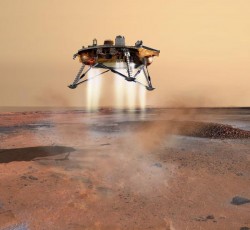We know that in space, no one can hear you scream. But what would things sound like on another planet?
When humans finally set foot on Mars, they’re going to be curious about everything around them.
What’s under that rock? What does it feel like to jump in the lower Martian gravity. What does Martian regolith taste like? What’s the bitcoin to red rock exchange rate?
As long as they perform their activities in the safety of a pressurized habitation module or exosuit, everything should be fine. But what does Mars sound like?
I urge all future Martian travelers, no matter how badly you want to know the answer to this question: don’t take your helmet off. With only 1% the atmospheric pressure of Earth, you’d empty your lungs with a final scream in a brief and foolish moment, then suffocate horribly with a mouthful of dust on the surface of the Red Planet.
But… actually, even the screaming would sound a little different. How different? Let me show you. First you just need to take your helmet off for a just a little sec, just an itsy bitsy second. Here, I’ll hold it for you. Oh, come on, just take your helmet off. All the cool kids are doing it.
What about Venus? Or Titan? What would everything sound like on an alien world?
We evolved to exist on Earth, and so it’s perfectly safe for us to listen to sounds in the air. No space suit needed. Unless you didn’t evolve on Earth, in which case I offer to serve as emissary to our all new alien overlords.
You know sounds travel when waves of energy propagate through a medium, like air or water. The molecules bump into each other and pass along the energy until they strike something that won’t move, like your ear drum. Then your brain turns bouncing into sounds.
The speed of the waves depends on what the medium is made of and how dense it is. For example, sound travels at about 340 meters/second in dry air, at sea level at room temperature. Sound moves much more quickly through liquid. In water it’s nearly 1,500 m/s. It’s even faster through a solid – iron is up past 5,100 m/s. Our brain perceives a different sound depending on the intensity of the waves and how quickly they bounce off our ears.

Other worlds have media that sound waves can travel through, and with your eardrum exposed to the atmosphere you should theoretically hear sounds on other worlds. Catastrophic biological failures from using your eardrums outside of documented pressure tolerances notwithstanding.
Professor Tim Leighton and a team of researchers from the University of Southampton have simulated what we would hear standing on the surface of other worlds, like Mars, Venus or even Saturn’s Moon Titan.
On Venus, the pitch of your voice would become deeper, because vocal cords would vibrate much more slowly in the thicker Venusian atmosphere. But sounds would travel more quickly through the soupy atmosphere. According to Dr. Leighton, humans would sound like bass Smurfs. Mars would sound a little bit higher, and Titan would sound totally alien.
Dr. Leighton actually simulated the same sound on different worlds. Here’s the sound of thunder on Earth.
Here’s what it would sound like on Venus.
And here’s what it would sound like on Mars.
Here’s what a probe splashing into water on Earth would sound like.
And here’s what it would sound like splashing into a hydrocarbon lake on Titan.
You might be amazed to learn that we still haven’t actually recorded sounds on another world, right up until someone points out that putting a microphone on another planet hasn’t been that big a priority for any space mission.

Especially when we could analyze soil samples, but hey fart sounds played and then recorded in the Venusian atmosphere could prove incredibly valuable to the future of internet soundboards.
The Planetary Society has been working to get a microphone included on a mission. They actually included a microphone on the Mars Polar Lander mission that failed in 1999. Another French mission was going to have a microphone, but it was cancelled. There are no microphones on either Spirit or Opportunity, and the Curiosity Rover doesn’t have one either despite its totally bumping stereo.
Here’s is the only thing we’ve got. When NASA’s Phoenix Lander reached the Red Planet in 2008, it had a microphone on board to capture sounds. It recorded audio as it entered the atmosphere, but operators turned the instrument off before it reached the surface because they were worried it would interfere with the landing.
Meh. I’m going to need you to do better NASA. I want an actual microphone recording winds on the surface of Mars. I hope it’s something Dethklok puts on their next album, they could afford that kind of expense.
It turns out, that if you travel to an alien world, not only would the sights be different, but the sounds would be alien too. Of course, you’d never know because you’re be too chicken to take your helmet off and take in the sounds through the superheated carbon dioxide or methane atmosphere.
What sounds would you like to hear on an alien world? Tell us in the comments below.



That was cool and thank you for making the video!
Very interesting article until the writer assumes we evolved on earth, come on, stick with science.
I think that this article, and all the other articles that began flowing in like this one would be well at home if the UT website design changed it’s look to look like a kindergarten classroom. You know, scroll the multi-colored alphabet across the top of the page, throw a row of crayola crayons down the side of the page, and tack some crayon drawings of grass with a sun in the upper corner down the other side and Bam! You created the place where these articles belong.